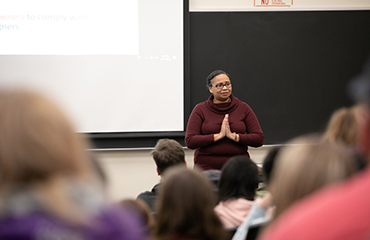
On Tuesday, Nov. 14, Dr. Kimberly Richburg, associate professor of political science at Lander University, provided students and community members with a uniquely in-depth and personal accounting of the groundbreaking Briggs v. Elliott case of 1952.
Challenging school segregation in Clarendon County, Briggs v Elliott was the first of five similar cases that were later combined into the renowned Brown v. Board of Education of 1954, which resulted in the U.S. Supreme Court ruling that racial segregation in public schools was unconstitutional.
A native of Clarendon, Dr. Richburg is a specialist in American politics. During the presentation, she shared her family's involvement with the Briggs v. Elliott case, and relayed childhood stories she remembers from that time. "My great uncle, Edward E. Richburg, was one of the community leaders who challenged the racially segregated public school system," she said. "At the time, the U.S. Supreme Court had ruled that it was okay to segregate in the school systems as long as the facilities for white and African American students were equal."
At the time, however, Clarendon schools were not equal for white and African American students. "Funding for white schools was three-to-four times more than what was spend on schools for black students," explained Dr. Richburg. "In fact, several black schools were dilapidated and students had to rent or buy textbooks that were outdated. The original petition, though, was for bus transportation for African American students. My father was fortunate because he lived only a mile from his school, but some black students were forced to walk seven or nine miles one way to their school."
When the petition was ignored, those who signed it filed the Briggs v. Elliott case. The filing was named for Harry Briggs, one of the 20 petitioners, and R.W. Elliott, president of the Clarendon County School Board.
Thurgood Marshall, then lead counsel for the NAACP Legal Defense Fund, and local attorney Harold Boulware formally filed the case. Julius Waring, a federal judge in Charleston, advised Marshall and Boulware to expand their efforts into a case against segregation.
While a three-judge panel with the U.S. District Court denied the petitioners' request for desegregation, they ordered the Clarendon County School Board to equalize funding for their schools. Judge Waring, though, disagreed with the decision, and spoke forcefully against segregation.
According to Dr. Richburg, those involved with the initiative faced retribution for their efforts. "Many petitioners lost their jobs, and those who farmed had a difficult time selling their crops. Even the daughter of my uncle, who was a teacher in the Clarendon School District, lost her job."
Achieving the Promise
Dr. Richburg's presentation was part of Lander's "Achieving the Promise: Democracy and the Informed Citizen" series that provides events throughout the 2018-2019 academic year, Building upon the university's legacy of civic engagement by giving a distinct set of opportunities and experiences for its campus community and the citizens within the Lakelands region. The presentation was funded in part by S.C. Humanities, a state program of the National Endowment for the Humanities. The "Democracy and the Informed Citizen" project is spearheaded by the national Federation of State Humanities Councils, of which S.C. Humanities is a member.
SC Humanities
The mission of South Carolina Humanities is to enrich the cultural and intellectual lives of all South Carolinians. This not-for-profit organization presents and/or supports literary initiatives, lectures, exhibits, festivals, publications, oral history projects, videos and humanities-based experiences that reach more than 250,000 citizens annually. South Carolina Humanities receives funding from the National Endowment for the Humanities as well as corporate, foundation and individual donors. It is governed by a volunteer Board of Directors comprised of community leaders from throughout the state.